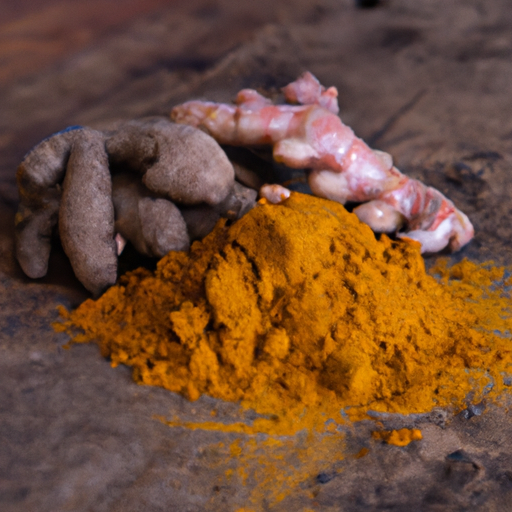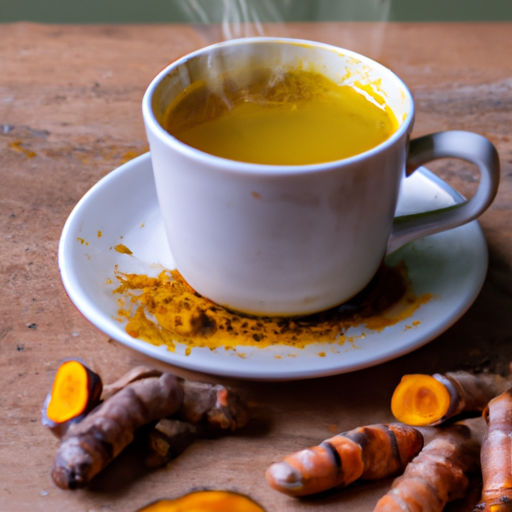Picture yourself enjoying a hot cup of tea that not only relaxes your mind but also offers various health advantages. Turmeric tea, also referred to as golden milk, has been increasing in popularity lately because of its possible health benefits.
This vibrant yellow tea is made by brewing turmeric root or powder in hot water or milk, creating a soothing and earthy flavor. If you’re searching for a natural way to improve your health, turmeric tea might be the answer you’re looking for.
This ancient spice has been used for thousands of years in traditional Ayurvedic medicine to treat a variety of ailments. From improving digestion to reducing inflammation, turmeric is known for its potent anti-inflammatory and antioxidant properties.
So, is turmeric tea good for your health? Let’s take a closer look at the benefits and potential side effects of this trendy beverage.
Key Takeaways
- Turmeric tea has potent anti-inflammatory and antioxidant properties due to the presence of curcumin, which can protect the body from free radicals and reduce inflammation.
- Drinking turmeric tea may have various health benefits, including improving brain function, reducing the risk of heart disease, and reducing joint pain and swelling.
- Turmeric tea can be brewed using high-quality turmeric powder or freshly grated turmeric root, and black pepper or ginger can be added to enhance the bioavailability of curcumin.
- It is crucial to consult a healthcare professional before using turmeric tea as a supplement, as excessive intake may cause adverse effects and interactions with certain medications.
What is Turmeric Tea?
Turmeric tea is a delicious and healthy drink that’s been enjoyed for centuries. It’s made by boiling turmeric root or powder in water, along with other spices like ginger, cinnamon, and black pepper.
The tea has a warm, earthy flavor that’s slightly bitter and spicy. Some people also add honey or lemon to sweeten the taste. To prepare turmeric tea, you can use fresh turmeric root or turmeric powder, which is more commonly available.
To make the tea, boil water in a small pot and add one teaspoon of turmeric powder or grated turmeric root. Add any other spices you like and let the mixture simmer for about 10 minutes. Strain the liquid into a cup and enjoy!
Moving on to the nutritional benefits of turmeric, this spice is packed with antioxidants and anti-inflammatory compounds that can help improve your health in many ways.
The Nutritional Benefits of Turmeric
Did you know that incorporating turmeric into your diet can provide you with essential nutrients? Turmeric is a spice that is commonly used in Indian and Middle Eastern cuisine. It contains a variety of essential nutrients that can boost your health.
Here are three nutritional benefits of turmeric:
- Turmeric is rich in curcumin, a powerful antioxidant that can protect your body from damage caused by free radicals.
- Turmeric is a good source of iron, which is essential for the production of red blood cells in your body.
- Turmeric is also rich in vitamin C, which can boost your immune system and protect your body from infections.
If you’re not a fan of cooking with turmeric, you can also take turmeric supplements. These supplements usually contain higher concentrations of curcumin than turmeric powder. However, it’s important to consult with your doctor before taking any new supplements.
Now that you know about the nutritional benefits of turmeric, let’s dive into the potential health benefits of turmeric tea.
Potential Health Benefits of Turmeric Tea
If you’re looking to improve your health, turmeric tea might be the answer you’re looking for.
This amazing drink has been shown to reduce inflammation, which can lead to a variety of ailments.
Additionally, turmeric tea may also improve brain function and reduce the risk of heart disease.
Finally, if you suffer from joint pain, turmeric tea may be able to provide some relief.
Reducing Inflammation
You’ll be happy to know that reducing inflammation can be as simple as incorporating a delicious cup of turmeric tea into your daily routine. Inflammation is a natural process that helps your body fight off infections and heal damaged tissue. However, when inflammation becomes chronic, it can lead to a range of health problems, including heart disease, cancer, and autoimmune disorders.
Studies have shown that turmeric, the main active ingredient in turmeric tea, has powerful anti-inflammatory properties. In fact, it has been found to be as effective as some anti-inflammatory drugs, but without the negative side effects. A table below shows some anti-inflammatory foods and natural remedies that can also help reduce inflammation.
| Anti-inflammatory Foods | Natural Remedies |
|---|---|
| Turmeric | Ginger |
| Blueberries | Omega-3 Fatty Acids |
| Broccoli | Green Tea |
Incorporating these foods and remedies into your diet, along with a cup of turmeric tea, can help reduce inflammation and improve your overall health. Now, let’s move on to how turmeric tea can improve brain function.
Improving Brain Function
Improving brain function is essential for maintaining cognitive ability as we age, and studies have shown that consuming turmeric regularly can lead to a 28% increase in memory and attention span. Here are some ways in which turmeric tea can help boost memory and enhance cognitive performance:
- Turmeric contains a compound called curcumin, which has been found to have neuroprotective effects and may help prevent age-related cognitive decline.
- Curcumin has also been shown to increase levels of brain-derived neurotrophic factor (BDNF), a protein that’s essential for the growth and survival of neurons in the brain.
Turmeric tea has antioxidant properties that may help protect the brain from oxidative damage and inflammation, both of which can contribute to cognitive impairment. Some studies suggest that turmeric may also have antidepressant effects, which could help improve cognitive function in people with depression. Finally, turmeric tea is a natural and safe way to enhance brain function, without the potential side effects of some prescription drugs.
Reducing the risk of heart disease is another important benefit of consuming turmeric tea.
Reducing the Risk of Heart Disease
Now that we’ve discussed how turmeric tea can improve brain function, let’s move on to another important health benefit – reducing the risk of heart disease.
Heart disease is a leading cause of death worldwide, and prevention strategies and lifestyle changes are key in reducing the risk of this disease. Turmeric contains a compound called curcumin, which has been shown to have anti-inflammatory and antioxidant properties that may help protect against heart disease.
One study found that taking a daily dose of curcumin for eight weeks lowered markers of inflammation and improved the function of the endothelium, the lining of the blood vessels. Endothelial dysfunction is a key factor in the development of heart disease. While more research is needed, incorporating turmeric tea into your daily routine may be a simple and tasty way to support heart health.
Now, let’s move on to another benefit of turmeric tea – relieving joint pain.
Relieving Joint Pain
Relieving joint pain can be a challenge, but incorporating a natural alternative like turmeric tea into your routine may provide some relief. Here are some ways turmeric tea can help with joint pain:
- Turmeric contains a compound called curcumin, which has anti-inflammatory properties that can reduce joint swelling and pain.
- Turmeric tea can also help improve flexibility and mobility in joints, making it easier to move without discomfort.
Drinking turmeric tea regularly may also help prevent joint damage and slow down the progression of arthritis. Incorporating turmeric tea into your exercise routine can help with post-workout muscle soreness and joint pain. Turmeric tea can also be used as a natural alternative to over-the-counter pain relievers, which can have negative side effects with prolonged use.
As with any natural remedy, it’s important to consult with a healthcare professional before incorporating turmeric tea into your routine. In the next section, we’ll explore the scientific evidence behind these claims.
Scientific Evidence Behind Claims
Although it may seem like a trendy health fad, there’s actually scientific evidence supporting the benefits of drinking turmeric tea.
While there are controversial studies and conflicting opinions about the effectiveness of turmeric supplements, turmeric tea has been shown to have positive effects on various health conditions.
For example, one study found that curcumin, the active ingredient in turmeric, was effective in reducing inflammation and pain in patients with osteoarthritis.
Compared to other turmeric supplements, turmeric tea may have additional health benefits due to the presence of other compounds in the tea.
For example, turmeric tea contains antioxidants and anti-inflammatory compounds that may work together to provide additional health benefits.
While more research is needed to fully understand the effects of turmeric tea, current evidence suggests that it may be a beneficial addition to a healthy diet.
Moving onto dosage and preparation, it’s important to note that the amount of turmeric used in tea can vary depending on personal preference and the desired strength of the tea.
Dosage and Preparation
To get the most out of this natural remedy, you’ll want to follow these simple steps for dosage and preparation. Start by brewing turmeric tea using high-quality turmeric powder or freshly grated turmeric root.
Boil water, add turmeric, and let it simmer for 10-15 minutes. You can add black pepper or ginger to enhance the bioavailability of curcumin, the active ingredient in turmeric.
Strain the tea and enjoy it hot or cold. The recommended intake of turmeric tea varies depending on the purpose of use.
For general health benefits, one to two cups of turmeric tea per day is sufficient. However, for specific health conditions such as arthritis or inflammation, it’s recommended to consult a healthcare professional to determine the appropriate dosage.
With the right dosage and preparation, turmeric tea can be a healthy addition to your diet.
Moving on to the subsequent section about possible side effects, it’s important to note that while turmeric is generally safe for consumption, excessive intake may cause certain adverse effects.
Possible Side Effects
Be cautious when consuming this natural remedy, as with any substance, there are two sides to the coin, and it’s important to understand the possible side effects that may arise. Using turmeric as a natural remedy is like walking a tightrope; one misstep, and you may experience adverse effects that could have been prevented. Some people may experience allergic reactions to turmeric, which can range from mild to severe. Symptoms of an allergic reaction include hives, itching, swelling, and difficulty breathing. If you experience any of these symptoms after consuming turmeric tea, it’s best to seek medical attention immediately.
Additionally, turmeric may interact with certain medications, including blood thinners and diabetes medications. If you are taking any prescription medications, it’s crucial to consult with your healthcare provider before consuming turmeric tea. They can advise you on whether it’s safe to consume and any potential interactions that you should be aware of. By being aware of these possible side effects and interactions, you can make an informed decision about whether turmeric tea is right for you. In the next section, we’ll discuss who should avoid turmeric tea altogether.
Who Should Avoid Turmeric Tea?
If you have a history of allergic reactions or are taking certain medications, it’s important to consult with a healthcare professional before incorporating turmeric tea into your diet. This natural remedy may cause side effects, such as stomach upset, nausea, and diarrhea. Additionally, some people may be allergic to turmeric and experience symptoms such as hives, itching, and difficulty breathing.
It’s also important to note that turmeric may interact with certain medications, including blood thinners and diabetes medications. Therefore, it’s crucial to speak with your doctor before using turmeric tea as a supplement.
If you’re not able to consume turmeric tea, there are other ways to incorporate this spice into your diet. Let’s explore some of these options in the following section.
Other Ways to Incorporate Turmeric into Your Diet
One alternative to sipping on turmeric tea is to add a pinch of the spice to your favorite smoothie recipe for an added boost of flavor and potential health benefits. Turmeric can easily be incorporated into many dishes, making it a versatile ingredient to have on hand.
Here are some other ways to enjoy turmeric in your meals:
- Try adding turmeric to scrambled eggs or tofu for a savory breakfast option.
- Use turmeric in a marinade for your protein of choice to add a flavorful and colorful twist to your next meal.
- Experiment with turmeric recipes, such as golden milk or a turmeric latte, to find a new favorite drink.
While incorporating turmeric into your diet through food is a great option, some people may still struggle to consume enough of the spice to reap its full potential health benefits. In that case, turmeric supplements may be a helpful addition to your routine.
Final Thoughts
Don’t forget to take care of yourself by finding ways to incorporate turmeric into your daily routine. Turmeric tea is a great way to enjoy the benefits of this powerful spice.
Drinking turmeric tea can do wonders for your skin, as it has anti-inflammatory and antioxidant properties that help reduce the appearance of fine lines and wrinkles. It can also help with weight loss by boosting your metabolism and reducing inflammation in the body.
One of the major benefits of turmeric tea is its ability to improve the appearance of your skin. The anti-inflammatory and antioxidant properties in turmeric can help reduce inflammation and oxidative damage, which can lead to premature aging and skin damage.
Additionally, turmeric tea can help with weight loss by boosting your metabolism. Studies have shown that the active compound in turmeric, called curcumin, can increase thermogenesis, which is the process by which the body burns calories to produce heat. This can lead to increased calorie burn and ultimately, weight loss.
Frequently Asked Questions
Can turmeric tea be consumed by pregnant women?
You can drink turmeric tea during pregnancy and while breastfeeding in moderate amounts. However, excessive intake is not recommended as it may lead to complications. Consult your doctor before consuming it to ensure safety.
How long does it take for turmeric tea to show its health benefits?
Turmeric tea is like a superhero, taking time to show its benefits. Studies suggest regular intake of 500-2000mg curcumin, the active compound in turmeric, for maximum benefits. However, consult a healthcare provider before starting any new regimen.
Is it safe to consume turmeric tea on a daily basis?
Consuming turmeric tea daily has potential benefits such as reduced inflammation and improved brain function. However, excessive consumption can lead to stomach problems and interact with certain medications. Consider the pros and cons before making a decision.
What is the difference between using fresh turmeric and turmeric powder in tea?
When making turmeric tea, using fresh turmeric root or powdered turmeric both provide health benefits beyond reducing inflammation. Fresh turmeric has a stronger flavor and aroma, while powdered turmeric is more convenient to use.
Can turmeric tea interact with certain medications?
Turmeric tea can interact with certain medications, including blood thinners and stomach acid reducers. It’s important to talk to your doctor if you are taking any medication before consuming turmeric tea. Alternative remedies include ginger tea and chamomile tea.
Conclusion
Congratulations, you’ve now learned about the potential health benefits of turmeric tea. As you now know, turmeric is a spice that’s known for its bright yellow color and distinct flavor. It’s been used for centuries for its medicinal properties.
One interesting statistic worth noting is that a study published in the Journal of Medicinal Food found that consuming turmeric tea improved memory and attention in healthy older adults. This suggests that incorporating turmeric into your diet may have cognitive benefits as well.
While there’s still more research to be done, the evidence suggests that turmeric tea may offer a range of health benefits. These include reducing inflammation, improving heart health, and boosting cognitive function.
Remember to always consult with a healthcare professional before making any major changes to your diet or lifestyle. And if turmeric tea isn’t your cup of tea, there are plenty of other ways to incorporate this powerful spice into your meals.










